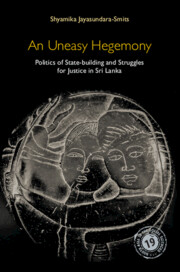Book contents
- Frontmatter
- Dedication
- Contents
- List of Tables and Figure
- Preface
- Acknowledgements
- List of Abbreviations
- 1 Introduction
- 2 Politics of Judgement
- 3 From Nationalism to Ethnic Supremacy
- 4 Political Patronage: Underbelly of Everyday Politics
- 5 State Institutions and Patronage Politics
- 6 War and Peace as Politics by Other Means
- 7 What Came after War?
- Afterword
- Appendix 1 Map of Sri Lanka
- Appendix 2 Indication of Background of Key Interviewees (from January to May 2009)
- Bibliography
- Index
3 - From Nationalism to Ethnic Supremacy
Published online by Cambridge University Press: 29 July 2022
- Frontmatter
- Dedication
- Contents
- List of Tables and Figure
- Preface
- Acknowledgements
- List of Abbreviations
- 1 Introduction
- 2 Politics of Judgement
- 3 From Nationalism to Ethnic Supremacy
- 4 Political Patronage: Underbelly of Everyday Politics
- 5 State Institutions and Patronage Politics
- 6 War and Peace as Politics by Other Means
- 7 What Came after War?
- Afterword
- Appendix 1 Map of Sri Lanka
- Appendix 2 Indication of Background of Key Interviewees (from January to May 2009)
- Bibliography
- Index
Summary
While I acknowledge the relevance of the ethno-nationalism discourses for understanding Sri Lanka's past and present politics and state-building, in this chapter I want to draw attention to the importance of class-based roots of ethnic-nationalism. By examining the class roots of Sinhala-Buddhist nationalism, it becomes possible to shed light on how gradual transformations in class relations under the impetus of changing political and economic conditions have come about since the early 19th century. The importance of historical legacies of class relations in forming the current toxic form of Sinhala-Buddhist nationalism can thus add something to the more usual ethno-religious accounts of political transformation and state-building. A more nuanced analytical account of class conflicts within the Sinhalese majority population can help to explain and illustrate how class conflict paved the way for the galvanising of Sinhala-Buddhist nationalism as a profound hegemony-building tool in its current exclusionary form.
THE STRANGE STORY OF CLASS ORIGINS OF SINHALA-BUDDHIST NATIONALISM
The genesis of Sinhala-Buddhist nationalism can be traced back more or less to the second half of the 19th century, with the first emergence in Sri Lanka of something like a Sinhala ‘identity’ or consciousness (that is, the Sinhalese became aware that they were a distinct group of people) (Jayawardena 1987b: 2). During late British colonial rule, this vague notion of collective ethnic and religious identity was transformed into a distinctly Sinhala-Buddhist form of nationalism. In its early form, it was described as ‘religious nationalism’, reflecting the way that certain politically significant events were expressed in Sri Lanka prior to the country's independence. This phase of late colonial history is commonly described as a period of anti-colonial and ‘first generation nationalism’.
However, in the post-independence period, ethnic identity formation became a more important element in overall Sinhala-Buddhist nationalism, alongside religion and anti-Western sentiments (Wickramasinghe 2006: 45). It was in part the result of the British colonial power's systematic categorisation of colonial ‘subjects’ that ethnic and religious identities were mobilised in such a rigid and exclusionary manner. Numerous identity labels were used, involving caste, race, ethnic and religious groupings. All these were an attempt to ‘describe something that had practical and conceptual coherence … for outsiders and observers rather than for Sri Lankans themselves’ (Wickramasinghe 2006: 48).
- Type
- Chapter
- Information
- An Uneasy HegemonyPolitics of State-building and Struggles for Justice in Sri Lanka, pp. 57 - 112Publisher: Cambridge University PressPrint publication year: 2022

